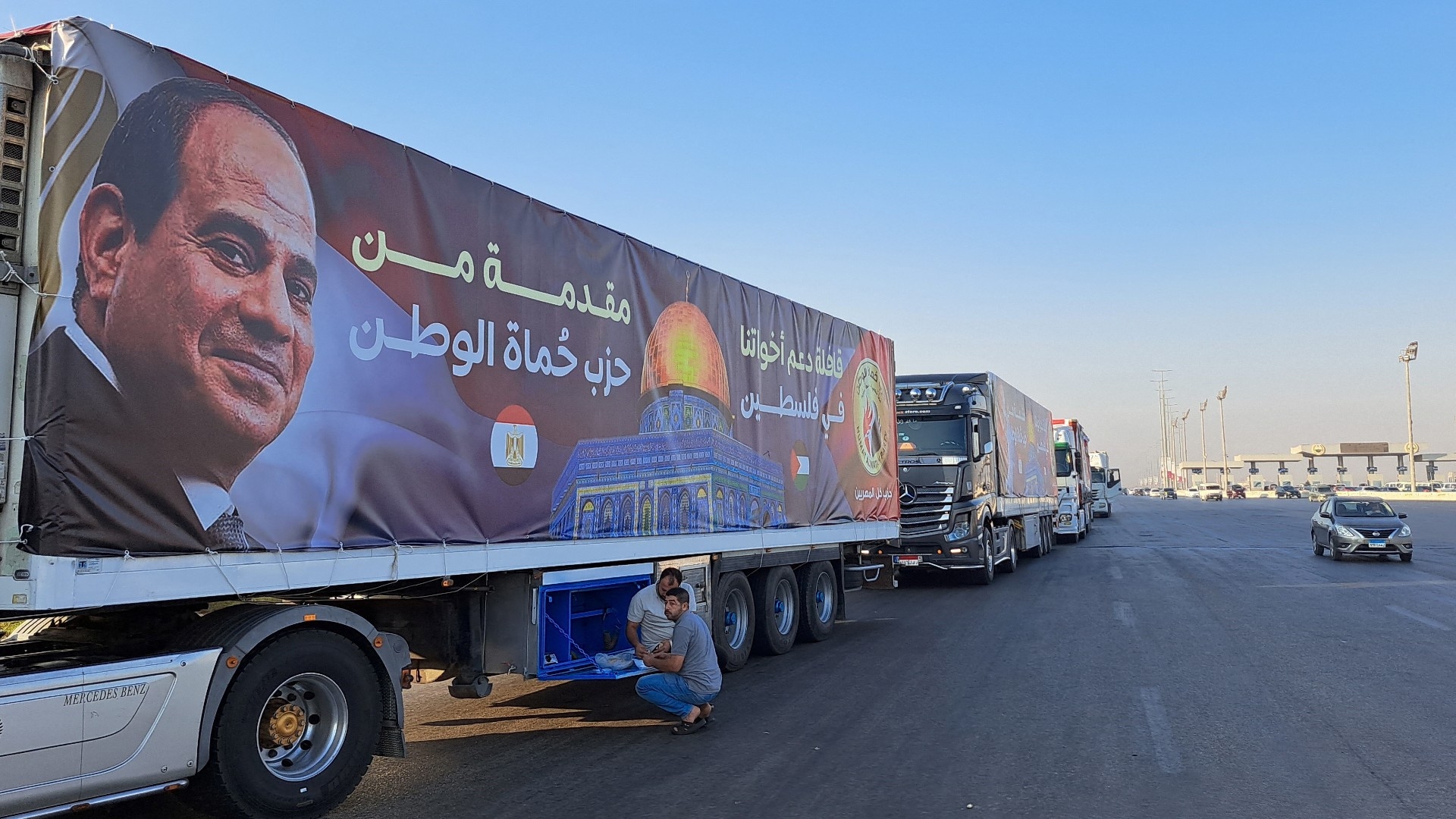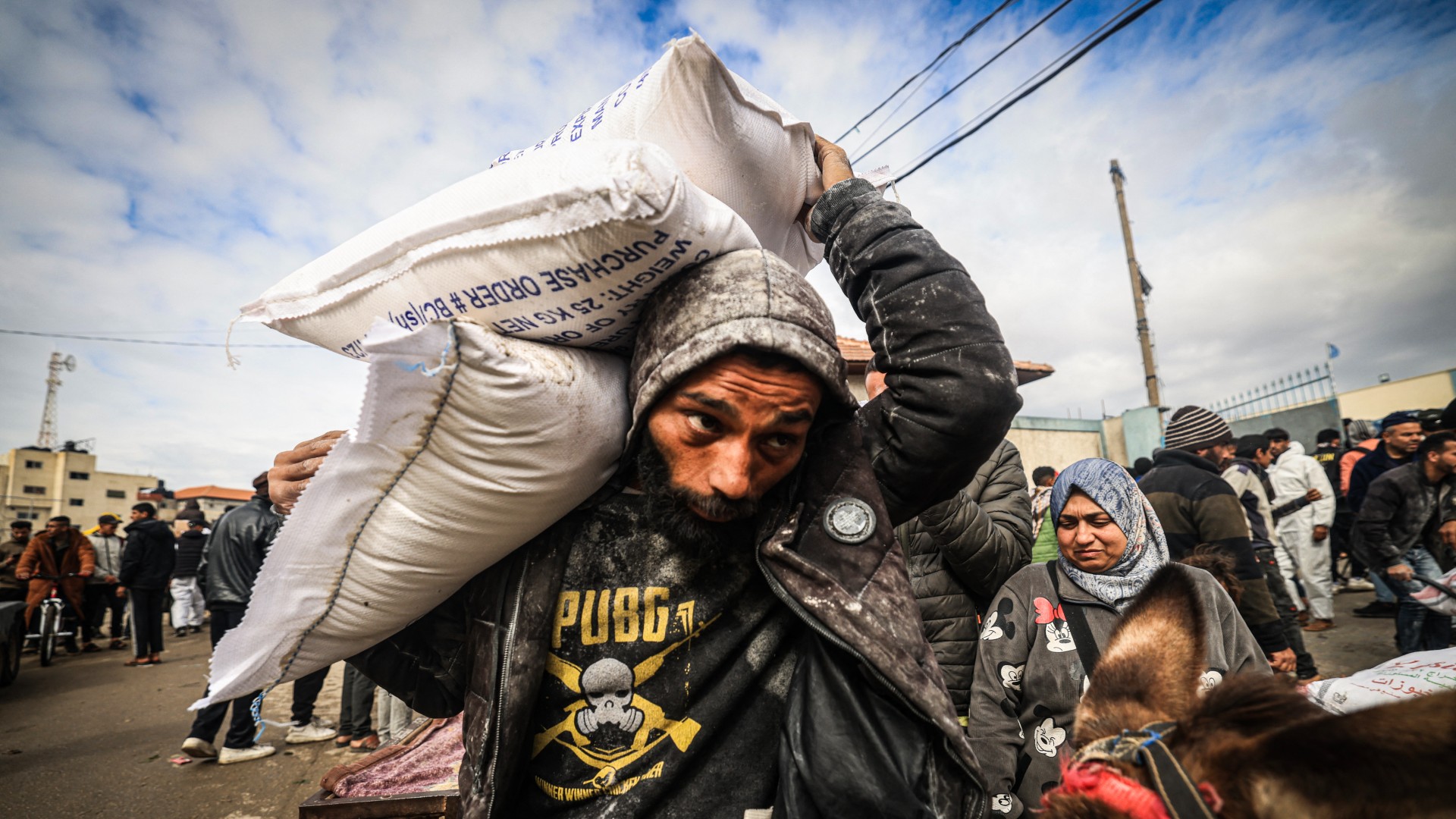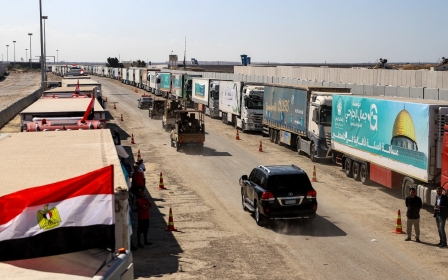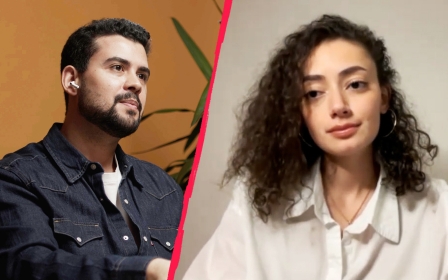War on Gaza: Charity says Egypt intelligence-linked firm charging $5,000 to get aid over border

An international charity with extensive experience in providing emergency aid in wars, famines and earthquakes throughout the Middle East and in Afghanistan is being forced to pay $5,000 a truck to a company linked to Egypt’s General Intelligence Service (GIS) to get aid into Gaza.
The charity, which does not want to be named to avoid obstruction to its relief efforts in Gaza, spoke to Middle East Eye in outrage at having to pay what it openly describes as a bribe to a state-linked agent.
A spokesman for the charity said: “We have worked around the world in times of war, earthquakes and other disasters, but we have never been treated like this by a state who is profiteering from the dispatch of humanitarian goods. It’s draining a lot of our resources and the bribe being paid is per truck.”
The charity said the money is being paid in the form of a “management fee” to a company affiliated with the Sons of Sinai, a construction and contracting firm owned by the Sinai businessman, Ibrahim al-Organi, and part of his Organi Group.
He heads the Tarabin tribe in the Sinai desert bordering Israel and owns a company that is a joint venture with two companies owned by the GIS.
New MEE newsletter: Jerusalem Dispatch
Sign up to get the latest insights and analysis on Israel-Palestine, alongside Turkey Unpacked and other MEE newsletters
The Organi Group is alleged in media reports to be the ultimate beneficiary of a lucrative sale of “fast-track” permits for Palestinians wishing to escape from Israel's war on the Gaza Strip.
An investigation carried out by the Organized Crime and Corruption Reporting Project (OCCRP) and independent Egyptian website, Saheeh Masr, found that intermediaries were selling exit permits at prices ranging from $4,500 to $10,000 for Palestinians and $650 to $1,200 for Egyptians.
As desperation in Gaza has increased, the price for a passage out of the enclave has gone up to $10,000 per person, Al-Araby Al-Jadeed reported recently. The price for commercial traffic going into Gaza charged by companies owned by Organi is $9,000 a truck, although the cost of the fare charged by truckers is commonly just $300 a load.
A spokesperson for Unrwa, the UN agency for Palestinian refugees providing vital support in Gaza, told Middle East Eye it is not paying fees to transfer aid into the enclave from Egypt.
Bleak situation
The charity’s statement to MEE is the first concrete evidence of Egypt or Egyptian government-linked parties demanding a cut from the humanitarian aid going into Gaza, which already is subject to weeklong delays incurred by Israel.
Earlier this month, James Heappey, the British minister of state for the armed forces, said that over 150 tonnes of humanitarian aid delivered to Egypt by the Foreign Commonwealth and Development Office (FCDO) is waiting to be transferred into Gaza.
The humanitarian situation in Gaza is bleak. More than 26,000 Palestinians have been killed since the war broke out in October, and on Sunday, a UN expert said famine in the enclave was “inevitable”.
Last week, Middle East Eye spoke to five families from Gaza who all confirmed that they had paid fees in the thousands, mostly in US dollars or euros, to mediators who then facilitated their exit from Gaza.
Besan, a Palestinian who arranged for her mother to leave Gaza, said of her Suez-based mediator: “He told us that he works with Egyptian security and that he would pull strings to put our mother’s name on the list.”
Egypt denied it is profiteering from this trade at the Rafah border. In a statement published on 10 January, the head of Egypt’s State Information Service, Diaa Rashwan, rejected the “unfounded allegations” that additional fees are being imposed on Palestinians at the crossing.
A parallel “fast-track” system for getting through Rafah has been in place for years, with Gaza-based agents demanding several thousand dollars for quick passage. But this market has boomed since Israel’s ground attack started and the desperation of internally displaced Palestinians has grown.
One of the companies allegedly involved in the trade is Hala Consulting and Tourism, an Egyptian travel agency. This is one of eight companies operating under Organi’s chief arm, the Organi Group.
Another company in the same group is Misr Sinai, a joint venture with the Egyptian defence ministry’s industrial conglomerate, the National Services Projects Organisation (NSPO)
Organi said in an interview with Youm7 in 2014 that the NSPO owned 51 percent of Misr Sinai’s shares, in partnership with two companies owned by the GIS. “As you can see, all state entities are in this company. This gives us an advantage,” Organi said in the interview.
Denying responsibility
Organi’s companies first surfaced in 2014 when Egyptian President Abdel Fattah el-Sisi announced an initiative to rebuild houses destroyed in Gaza by Israel’s Operation Protective Edge. The Organi Group was named as one of the beneficiaries.
Hala Company for Consulting and Tourism Services was relaunched in 2021 to “exclusively undertake the transportation of travellers to and from the Gaza Strip”.
At that time, the cross-border traffic managed by Hala was described by Egyptian sources speaking to Al-Araby Al-Jadeed in 2021 as part of a response by Cairo to “a major demand of the Palestinian factions regarding facilitating travel through the Rafah crossing to alleviate the suffering of the Palestinians”.
'If I am the reason for not letting a loaf of bread into Gaza, how could I face God?'
- Abdel Fattah el-Sisi
Egypt has denied profiteering from the crossing at Rafah and from being responsible for the long tailbacks of lorries carrying humanitarian aid at the Egyptian side of the border.
During its defence against charges of committing genocide in Gaza, in a case brought to the International Court of Justice earlier this month, Israel’s defence team accused Cairo of being responsible for preventing the entry of humanitarian aid into the enclave.
Speaking in Somalia, Sisi accused Israel of holding up the trucks on the Gaza side of the Rafah border.
He said: “If I am the reason for not letting a loaf of bread into Gaza, how could I face God?”
MEE asked Egypt’s State Information Service to comment on the charity’s claim that it had to pay $5,000 a truck to agents linked to the General Intelligence Service, but they failed to reply by the time of publication.
Middle East Eye has also asked the Organi Group and Sons of Sinai for comment.
This article is available in French on Middle East Eye French edition.
Middle East Eye delivers independent and unrivalled coverage and analysis of the Middle East, North Africa and beyond. To learn more about republishing this content and the associated fees, please fill out this form. More about MEE can be found here.





